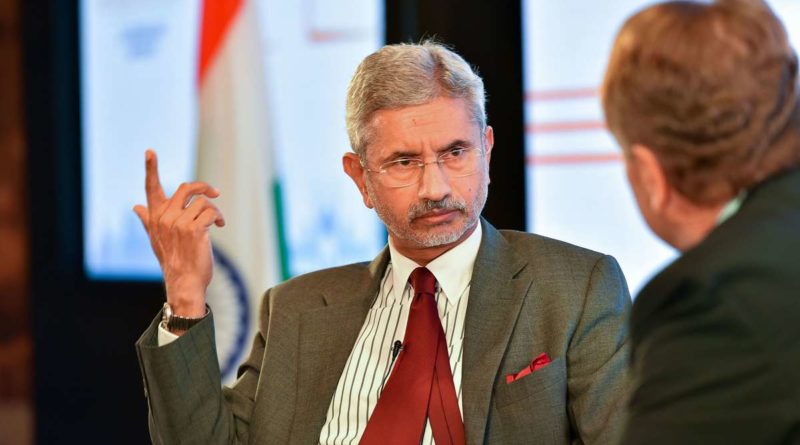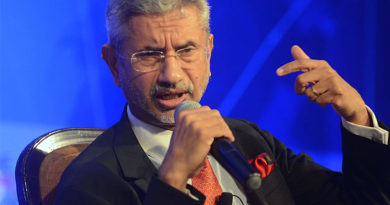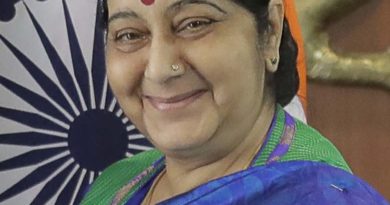Interview of Sharif Hamdampur, Editor-in-Chief of the “Tojikiston” Newspaper with the Minister of External Affairs of the Republic of India H.E. Mr. Subrahmanyam Jaishankar
Interview of Sharif Hamdampur, Editor-in-Chief of the “Tojikiston” Newspaper with the Minister of External Affairs of the Republic of India H.E. Mr. Subrahmanyam Jaishankar
1. Mr. Minister, first of all we would like to welcome you to the capital of Tajikistan, Dushanbe.
Thank you. I also thank the Tajik Government for extending an invitation to me to visit Dushanbe – both for the bilateral official visit as well as for participation in the Heart of Asia Conference.
2. India is a key country not only on the Asian continent but also in the world. Your participation in this conference is an important factor in ensuring peace and stability in Afghanistan. Unfortunately, the war in Afghanistan has become a global problem, hindering the development of India’s economic relations with the countries of the region.
Peace and stability in Afghanistan is crucial for the regional peace and stability. India has always stood for a sovereign, peaceful and united Afghanistan. India has been supportive of all the efforts to bring durable peace in Afghanistan.
People of Afghanistan have consistently spoken against violence and targeted assassinations of civilians. We need reduction in violence followed by permanent and comprehensive ceasefire. This sentiment was echoed in the Heart of Asia meeting.
Lack of overland connectivity remains an impediment to enhanced trade and commerce between India and Central Asia. We need to find ways and means to bridge this connectivity gap including connectivity initiatives like International North-South Transport corridor, greater use of Chabahar port etc. It is also important to provide year round access to Afghanistan to ensure barrier – free trade. India as the lead country for Trade, Commerce and Investment Confidence Building Measure (CBM) under HoA-IP, has made concerted efforts for strengthening regional connectivity and greater economic integration of Afghanistan with the region. A dedicated Air Freight Corridor between cities of India and Afghanistan and operationalization of Chabahar Port are steps in that direction. Similar arrangements could be discussed with Central Asian partners.
3. Today, the world community is concerned about the political situation in Afghanistan. Tajikistan has always been a supporter of stability and security in this neighbouring country. In your opinion, what is the fundamental way to ensure peace in Afghanistan?
India, as an important stakeholder for peace, prosperity and stability in Afghanistan, has played a constructive role in the international processes on Afghanistan. India has engaged regional and international stakeholders on Afghanistan. This visit in Dushanbe will further enhance our outreach to Central Asian countries with a special focus on Afghanistan.
4. Terrorism and religious extremism are not only the problems of the region, but also of the modern world. As per your opinion, what is required for addressing this problem in the region?
We reiterate our resolve to combat terrorism in all its forms and manifestations. Terrorism cannot be justified on any ground be it political, religion, ethical or social. The spread of terrorist organisations at a global level and the significant rise in acts of terrorism directly undermine international peace and security and endanger ongoing efforts to strengthen the global economy and ensure sustainable growth and development.
We strongly recommend addressing the menace of global terrorism based on a comprehensive approach which should include, but not limited to, countering violent extremism, countering radicalisation and recruitment, disrupting terrorist movements, stopping all sources for financing of terrorism, stopping flow of FTFs (Foreign Terrorist Fighters), dismantling terrorist infrastructure, and countering terrorist propaganda through the internet.
We need to isolate the sponsors and supporters of terrorism. We urge all nations to enhance cooperation in intelligence sharing, law enforcement, developing best practices and technologies, mutual legal assistance, extradition arrangements, capacity building etc. for countering terrorism.
In its efforts to combat terrorism at the international level, India has been supportive of all ways and means thereby playing a leading role in shaping international opinion and urging the international community to prioritize the fight against terror.
Deepening of security cooperation is the need of the hour and should be based on a policy which isolates those who harbour, support and sponsor terrorists, which does not distinguish between ‘good’ and ‘bad’ terrorists. In order to succeed, humanity would have to come together to fight unitedly and speak against the menace so that terrorism is de-legitimized.
5. What is your impression after participating in the 9th ministerial conference “Heart of Asia – Istanbul Process”?
It was a useful and timely experience to exchange our views on issues of regional and international significance. I had an opportunity to meet and share our perspectives with President H.E. Emomali Rahmon, President H.E. Dr. Ashraf Ghani and leaders from the region. I highlighted the need for harmonizing the interests of all the countries for arriving at common solutions.
On Afghanistan, if the peace process has to be successful, it is necessary to ensure that the negotiating parties continue to engage in good faith with a serious commitment towards reaching a political solution. We are striving for more inclusive Afghanistan that can overcome decades of conflicts. For this to happen, we need to stay true to the principles that Heart of Asia has long embodied. There was broad consensus among all participants to reduce violence and establish a permanent and comprehensive ceasefire in Afghanistan.
6. Are you satisfied with the results of the conference?
Of course, this conference provided an important opportunity to discuss issues related to stability in Afghanistan. It is too early to review the results from this meeting. Because the situation in Afghanistan has still remained unchanged.
7. Political analysts say the only way to bring peace and stability to Afghanistan is to establish a federal state there. Do you agree with this view?
Only the Afghan people can solve this issue. Only they can decide on what principle such a federal state can be created. India, as a friendly and neighborly country would accept and support the decision of the Afghan people in this regard.
8. India has been and is a tolerant country and we hope it will continue to remain this way. The existence of different religions and religious sects in your country testifies to this. What is the reason behind this: is it because of the nature of the people of India or the laws of the country or is there some other mystery behind it?
India is an ancient civilization of religious pluralism and cultural diversity. We are a 5,000 old year civilization and the Indian subcontinent is the birthplace of many of the world’s major religions. This diversity and pluralism is not only an eternal part of our social fabric but ingrained in our very ethos. It is in the nature of the Indian people and therefore expressed in our Constitution.
9. On the sidelines of the conference, you had a meeting with the President of the country, Emomali Rahmon. What issues were discussed between the parties?
Basically, the topic of our meeting was issues of security, economics, education and healthcare. We expressed our readiness to contribute to the economic development of Tajikistan, especially in the industry development since India has good experience in this. We also considered the issues of regional security and the provision of peace in Afghanistan, which is important for Tajikistan.
10. Was the issue of vaccines also considered?
I agree with you that the world is going through unprecedented times. However, Prime Minister Modi has promised that the capacities of India in vaccine production will be shared for the greater good of the humanity. Under our ‘Vaccine Maitri’ programme, we have supplied more than 64 million doses of ‘Made in India’ vaccines to over 80 countries including our friendly and close partner – Tajikistan.
11. India and Tajikistan are connected not only through common culture – similar thinking and literary, cultural and architectural achievements- but also by the proximity of the border through the Wakhan Corridor in Badakhshan. Is it possible to connect Tajikistan and India through this corridor?
As you have rightly stated, Tajikistan and India are connected through history with a common cultural and linguistic heritage with extensive people to people to contacts over millennia. India has approx. 160 km long common border with Afghanistan in the Wakhan corridor area of Afghanistan. India has deep cultural, linguistic and historic ties with Afghanistan.
Given India’s large economy and market, India can contribute to the economic development if their economies of regional and neighbouring countries can be integrated with the Indian economy through trade and imports/exports/ investments.
There is a need for greater connectivity between the two countries which can lead to economic growth and development of Tajikistan. Land connectivity through Afghanistan and through Chabahar port have potential to expand trade and commerce. Similarly, we also need to work on greater air connectivity. We have established air freight corridor between Afghanistan and India. We need similar corridors between India and Central Asian countries, including Tajikistan.
12. What other possible and promising areas of cooperation exist for the development of India-Tajikistan relationship?
India can be a good market for Tajikistan to export its wonderful agricultural products such as fresh fruits and vegetables, dry fruits, medicinal herbs, cotton, precious and semi-precious metals and stones etc. Similarly, given India’s scientific and technical prowess, India can be a source for Tajikistan to import its requirement of pharmaceuticals (already being done), medical and diagnostic equipment, capital goods and machinery, engineering solutions etc.
Development cooperation has also become an important pillar of our bilateral relationship. We have successfully commissioned a number of projects over the years in Tajikistan under our grant assistance including IT equipment in schools, food processing plant, engineering workshop, pharmaceutical plant, IT centers, rehabilitation and modernization of the Varzob-1 hydroelectric power plant etc. We are happy to be involved in the 8-laning of the Dushanbe-Chortut highway, which once completed next year, would greatly help in decongesting Dushanbe. We are also looking at more community development grant projects as well as projects under our Line of Credit in Tajikistan. Training and capacity building would continue to be one of the focus areas of our cooperation. Tajikistan has an ambitious plan in the field of hydropower generation including large and small hydropower stations. Machinery for such hydro projects and creation of infrastructure for transmission of electricity are other areas for possible cooperation.
Another possible area with great potential is the tourism sector. If Indian tour operators and tourists could be made more familiar of the tourism potential of Tajikistan, then we could see a considerable increase in the tourist traffic from India to Tajikistan. The revenue generated from visit of Indian tourists could also lead to development of a lot of service industry in Tajikistan. Also, India has already become the preferred destination for Tajik patients seeking advanced medical treatment given India’s ability to provide world class treatment at very affordable prices. To increase this two way traffic it is necessary to increase the air connectivity between our two countries which would also lead to greater interactions between entrepreneurs and businessmen of two sides.”
The text is sourced from www.mea.gov.in and reproduced.




